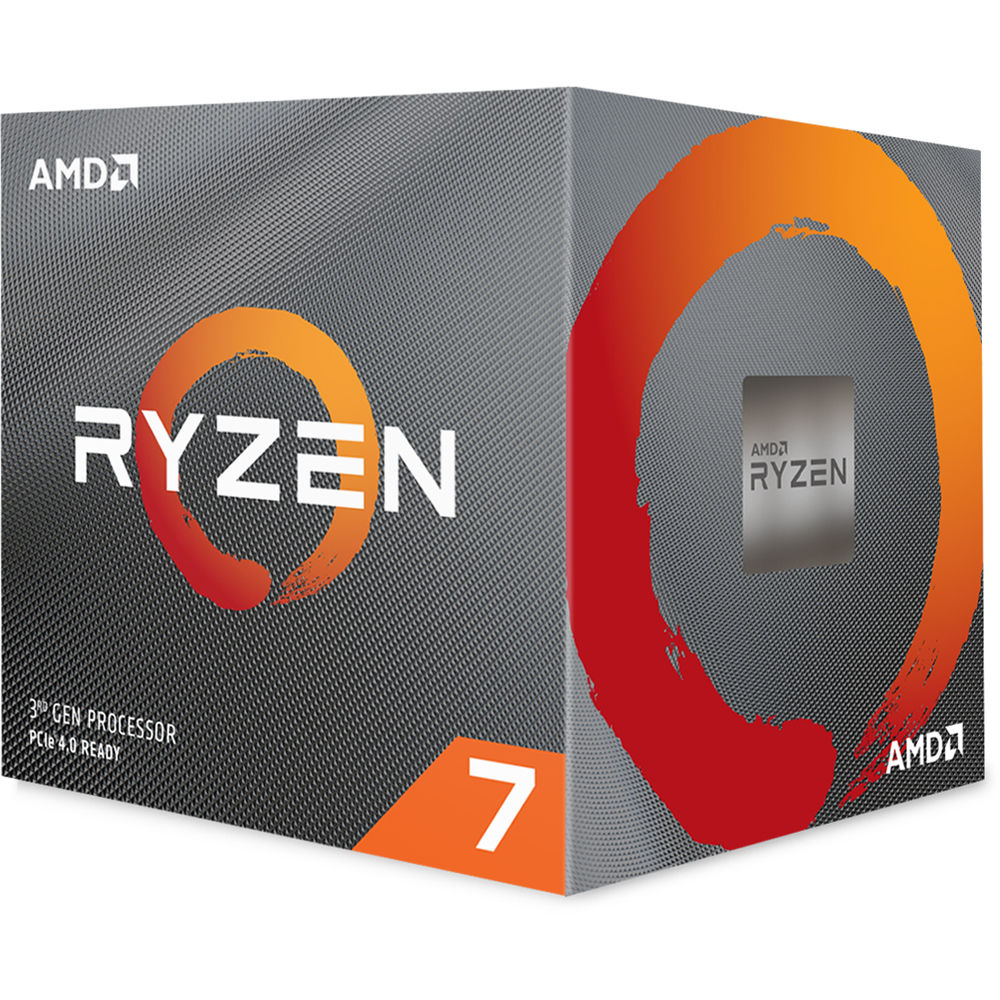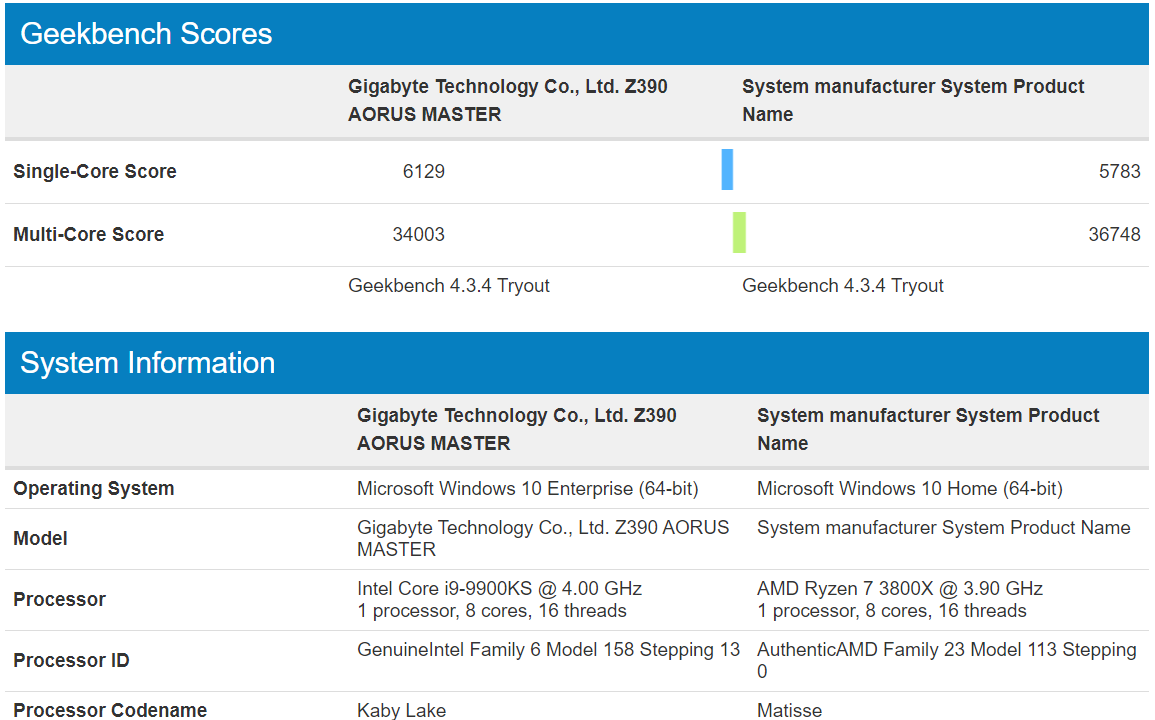Ryzen 7 3800X Prevails Over Core i9-9900KS in Geekbench Submission
In a fiery Geekbench 4 battle brought to your courtesy of an unverified test submission, the Ryzen 7 3800X appears to come out on top of the Core i9-9900KS in the multi-core test while Intel's part is still faster in single-core workloads. This certainly isn't the final word in the pending standoff between the two parts though, because there is a distinct possibility that the -9900KS's unverified Geekbench test was conducted with pre-release silicon that could undergo further tuning before it comes to market.
The Ryzen 7 3800X is one of AMD's latest Zen 2 processors that aims to take on Intel's Core i9-9900K in the octa-core market. On this occasion, famed chip detective TUM_APISAK posted two test results head-to-head with the Ryzen 7 3800X benchmark compared to results of the special edition Core i9-9900KS that Intel announced at Computex.
| Row 0 - Cell 0 | Price (USD) | Cores / Threads | TDP | Base Clock | Boost Clock | Total Cache | PCIe Lanes | Memory Support |
| Core i9-9900KS | ? | 8 / 16 | ? | 4.0 GHz | 5.0 GHz | 16MB | PCIe 3.0 x16 | DDR4-2666 |
| Core i9-9900K | $488 | 8 / 16 | 95W | 3.6 GHz | 5.0 GHz | 16MB | PCIe 3.0 x16 | DDR4-2666 |
| Ryzen 7 3800X | $399 | 8 / 16 | 105W | 3.9 GHz | 4.5 GHz | 32MB | PCIe 4.0 x24 | DDR4-3200 |
The Core i9-9900KS is an unreleased eight-core, 16-thread processor that features a 4 GHz base clock and 5 GHz all-core boost clock. Besides the chip's basic specifications, Intel hasn't revealed its TDP (thermal design power) or pricing. On the other side, the Ryzen 7 3800X also checks in with eight cores and 16 threads. The chip runs with a 3.9 GHz base clock and 4.5 GHz boost clock.
The Ryzen 7 3800X puts in a single-core and a multi-core score of 5,783 points and 36,748 points, respectively. The unverified Core i9-9900KS result scores 6,129 points in the single-core test and 34,003 points in the multi-core test. According to the submission, the Core i9-9900KS is roughly 5.98% faster than the Ryzen 7 3800X in single-core workloads while the Ryzen 7 3800X performs up to 8.07% faster in multi-core workloads.
The Geekbench benchmark benefits from faster memory. The Ryzen 7 3800X system was using memory clocked at 3,460 MHz while the Core i9-9900KS system was strangely utilizing memory running at 2,134 MHz. The significant difference in memory speeds clearly put the Core i9-9900KS at a disadvantage. Therefore, the difference in performance between both octa-core parts could be smaller than we think. We won't know until we test both processors under the same environment.
As always, you shouldn't pass judgment on a processor based on a single benchmark, especially an unverified submission uploaded to a public database. We already have a Ryzen 7 3800X in our lab for testing and can provide you with a full panorama of the processor's performance very soon.
Get Tom's Hardware's best news and in-depth reviews, straight to your inbox.

Zhiye Liu is a news editor, memory reviewer, and SSD tester at Tom’s Hardware. Although he loves everything that’s hardware, he has a soft spot for CPUs, GPUs, and RAM.
-
svan71 The significant difference in memory speeds clearly put the Core i9-9900KS at a disadvantage. Therefore, the difference in performance between both octa-core parts could be smaller than we think. BUT The Ryzen 7 3800X Prevails Over Core i9-9900KS in Geekbench SubmissionReply
terrible headline and "story". -
pyro226 I agree with the other post. Terrible story. The S series means "Performance-optimized lifestyle" - a little lower performance in exchange for lower power draw. Of course it's multi is going to be lower.Reply -
JQB45 I don't know about the rest of you but I can not wait for people to actually start reviewing the 3800X. So far it seems the 3700X and 3900X are getting the majority of the love with the 3600 not far behind.Reply
So far I have not seen a R7-3800X review. -
gamertaboo Reply
Have you not looked at anything to do with the 9900KS yet? It's the 9900k, except binned and 5Ghz all-core STOCK. It's going to pull so much power that Intel didn't want to say it's TDP lol. This is not one of the "S" chips like they used to do.pyro226 said:I agree with the other post. Terrible story. The S series means "Performance-optimized lifestyle" - a little lower performance in exchange for lower power draw. Of course it's multi is going to be lower.
https://www.pcworld.com/article/3397823/intels-reveals-the-beastly-core-i9-9900ks-likely-its-fastest-gaming-chip-for-real.html
It's going to be one of, if not THE fastest gaming CPU that Intel makes. -
SkyBill40 As a person who is considering the 3800X, I'm eager to see some live tests performed to see what benefits the extra TDP has, if any, when compared to the 3700X. I'm hoping it has a bit more OC headroom seeing that that seems to be pretty minimal across the board thus far. If there's not a tangible benefit of any kind for this CPU, I don't see the point in it being offered in the first place.Reply -
Freedom Seeker 2133 Mhz vs 3466 Mhz memory...Reply
Have you seen the ram benchmarks? A CPU can't go faster if ram limits it. And that's exactly what happened. They paired the best CPU with trashcan memory.
But intel is being very sleazy with their 9900KS. S stands for Special edition. So it is still very much the good old 9900K, except instead of hitting a lucky golden sample they're now hoarding them to release them as KS series.
Excellent marketing. Did you know that Silicon Lottery actually sells 9900KSS? SS standing for Super Special. Overclocking to 5.1 GHz on all cores. Oops! I wonder why they're all sold out? Maybe because they can't happen to find any new 9900K's which overclock to 5.1? I really wonder what happened to them, maybe they could be chilling in a special 9900KS edition dodecahedron? -
JQB45 I have seen a review/comparison on the 3700X vs the 3800X by Gamer's Nexus and he recommended using that $70 on something else like a better Motherboard, GPU, SSD, etc. When overclocked thee 3700X is functionally identical to an overclocked 3800X - there just isn't much head room left in the 3800X. If you are not going to overclock then the difference between the 3700X and 3800X is roughly ~1%.Reply -
ctrlf19 Replypyro226 said:I agree with the other post. Terrible story. The S series means "Performance-optimized lifestyle" - a little lower performance in exchange for lower power draw. Of course it's multi is going to be lower.
As the other poster stated the S in the 9900KS is different. In this case the 9900KS actually draws more power with a higher base and boost clock than the 9900K.
This is a good point, however a real test would be to compare the 3800X vs. the 9900KS with JEDEC memory clocks, so 3200MHz for the 3800X and 2666MHz for the 9900KS and while there would be a difference with a ~500MHz bump for the 9900KS and a ~350MHz reduction for the 3800X, I don't think it's going to make up the ~8% performance difference. Zen was always designed for scaling out to many cores, so it's not surprising that even at a single core disadvantage, the Zen-based parts perform better in multithreaded workloads.svan71 said:The significant difference in memory speeds clearly put the Core i9-9900KS at a disadvantage. Therefore, the difference in performance between both octa-core parts could be smaller than we think. BUT The Ryzen 7 3800X Prevails Over Core i9-9900KS in Geekbench Submission
terrible headline and "story". -
JQB45 I would expect the 3800X to win some, loose some but it looks like the 3700X is the better buy overall. I can't get behind the 9900K(S) because of its power usage. Funny everyone ridiculed AMD for making a CPU that drew huge amounts of power but people seem mostly silent with the 9900K(?)'s power usage.Reply -
Freedom Seeker Replyctrlf19 said:As the other poster stated the S in the 9900KS is different. In this case the 9900KS actually draws more power with a higher base and boost clock than the 9900K.
This is a good point, however a real test would be to compare the 3800X vs. the 9900KS with JEDEC memory clocks, so 3200MHz for the 3800X and 2666MHz for the 9900KS and while there would be a difference with a ~500MHz bump for the 9900KS and a ~350MHz reduction for the 3800X, I don't think it's going to make up the ~8% performance difference. Zen was always designed for scaling out to many cores, so it's not surprising that even at a single core disadvantage, the Zen-based parts perform better in multithreaded workloads.
Wow, a person who would use a 9900K with 2600 ram has appeared. Never thought I'd see the day. I would suggest people to compare them with equal rams that run at 4400 mhz or something. You can buy decent 4400 mhz ram for like 150$ and it's a no-brainer compared to buying 3200 mhz if you have a top-tier CPU. You pay 75$ more and you get 10% more FPS. Maybe you're also the kind of person to tell me that paying double the price for the ram is not worth the 10% performance increase?... When the overall cost of a PC went up 3%.
But even with that handicapped memory, 9900k would still outperform. Going from 2133 to 2666 would improve FPS a lot.
-m692eBH2JwView: https://www.youtube.com/watch?v=-m692eBH2Jw
-> see the FPS for 2133 vs 2666. It would scale a lot better with a 9900k but I couldn't find a video or benchmarks for that, the test uses a 8600k which is less memory dependant(the more CPU can output, the more ram bandwidth it needs to feed it). Even so, the difference in framerates is massive. Going from 2133 to 2666 shows a consistent 10-15% difference. You could probably have at least 15-20% difference with an overclocked 9900k instead.
So 3200MHz for the 3800X and 2666MHz for the 9900KS and while there would be a difference with a ~500MHz bump for the 9900KS and a ~350MHz reduction for the 3800X, I don't think it's going to make up the ~8% performance difference.
Your ridiculous claim doesn't seem to hold up. Just the difference alone in speeding up 9900K from 2133 to 2666 is more than 8%. And you wouldn't handicap 9900K(F? S? any 9900) chip with a 2666 memory either. You most definitely want a blazing fast memory with that CPU. Even 3200 mhz is like 65$, and I suggest getting at least a 4000 mhz memory for 9900k(the ram gets crazy expensive at high end, but you can still find 4400 at decent prices). I've bought myself a 4400 19-19-19-39 ram for $160, seems like it's sold out now. But you can still find other decent deals for fast memory ¬4000 mhz or higher. $160 for nearly equal performance is a killer deal compared to something like this
https://www.amazon.com/Kingston-Technology-HyperX-Predator-DDR4/dp/B07QTDD5TK/ref=sr_1_3?keywords=4600mhz&qid=1563932356&s=electronics&sr=1-3

